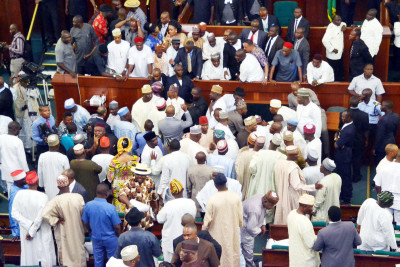
A breakdown of the N6.060 trillion Budget showed that consideration was given to certain critical sectors, like Job Creation, Payment to local contractors, the Nigeria Mortgage Refinancing Company, the Sinking Fund, as well as provision for Debt Servicing, among several others. Report SIMEON EBULU and TAOFEEK SALAKO
YESTERDAY’S approval of the N6.077 trillion Appropriation Bill by the Senate and the House of Representatives laid to rest controversies over the 2016 estimates proposed by President Muhammadu Buhari to the federal lawmakers of consideration.
The National Assembly sliced the N6.08 trillion Budget of Change sent by the Presidency by N17 billion.
Below are some of the highlights of the budget as approved for the President’s signature:
Payment of local contractors’ debts
The debts owed local contractors have continued to grow and have remained a source of concern to the government. At the federal and states level, about N11.2 trillion has been certified as the cumulative debts against the Federal Government and states. Of this amount, N400 billion is owed to contractors.
However, from the budgeted provisions, the Federal Government has set aside N25.5 billion to draw down the debt overhang. As indicated in the budget, the amount is dedicated for the payment of local contractors’ debts/other liabilities.
Refund to states for federal road projects
Under this sub-head, more than N5 billion has been earmarked, or set aside as Capital Supplementation under Refunds to States for Federal Road Projects. Given that some states have laid claims to spending several billions of naira in fixing federal roads, the amount is a far cry from what is desired and it may fall short of satisfying the yearnings of the affected states.
Nuclear programme financing
The nation’s nuclear programme is considered important in many respects. It serves an input in treatment for cancer patients, and as well serves as a power, or energy source when fully developed. The budget under review has set aside N2 billion for the sector’s activity in the current fiscal year.
The document indicated that the vote is for the financing of the implementation of the nation’s Nuclear Power Programme. This is a critical area that requires more attention, given the gap that exists between the projected power generation and what obtains at the moment.
The President is calling for 10,000 megawatts in a few years, but the country generates a range of between 2,000 megawatts and 4,000 megawatts at the moment.
Nigeria Mortgage Refinancing Company (NMRC)
This is an important entity as far as providing affordable houses is concerned. The N2 billion provision would be seen by many as inadequate.
The essence of the NMRC is to provide funding on a revolving arrangement to property developers under a mortgage refinancing arrangement.
Special intervention /constituency projects
This sub-head has a N100 billion provision. The purpose for it is is set out under Capital Supplementation and under Special Intervention/Constituency Projects. Some of these projects come under the purview of senators and House of Representatives members. They are located within the respective legislators’ constituencies. Although a N100 billion vote seems inadequate in the interim, it would suffice in the long-run, given that consideration may have been given to other projects to be cited in the communities as dictated by both by the federal and state governments.
The sum of N2 billion is available for this scheme under Capital Supplementation. This is obviously outside the various jobs that would be created across board from the Ministries, Departments and Agencies (MDAs), as well as from the private sector, from which, huge financial commitments have been made.
Sinking Fund for Infrastructural Development
Some N10 billion has been set aside for the above purpose. It will represent the federal government’s contribution to the fund, essentially meant for developing and improving infrastructure. Every Nigerian agrees on the need to focus on this area.
Special Initiative for Women
The N1.5 billion under this sub-head will encourage women participation in agriculture, sports, communications and women development centres at the grassroots, among others. This provision is both gender and sector-specific.
Debt Servicing
The provision of a princely N1.307 trillion for this purpose underscore the level of indebtedness, or debt overhang of the Federal Government to creditors. Precisely, one trillion, three hundred and seven billion, and four hundred million naira is the total amount reserved for debt service.

0 comments